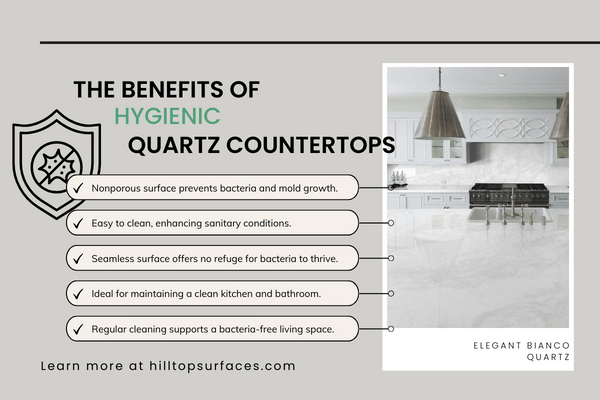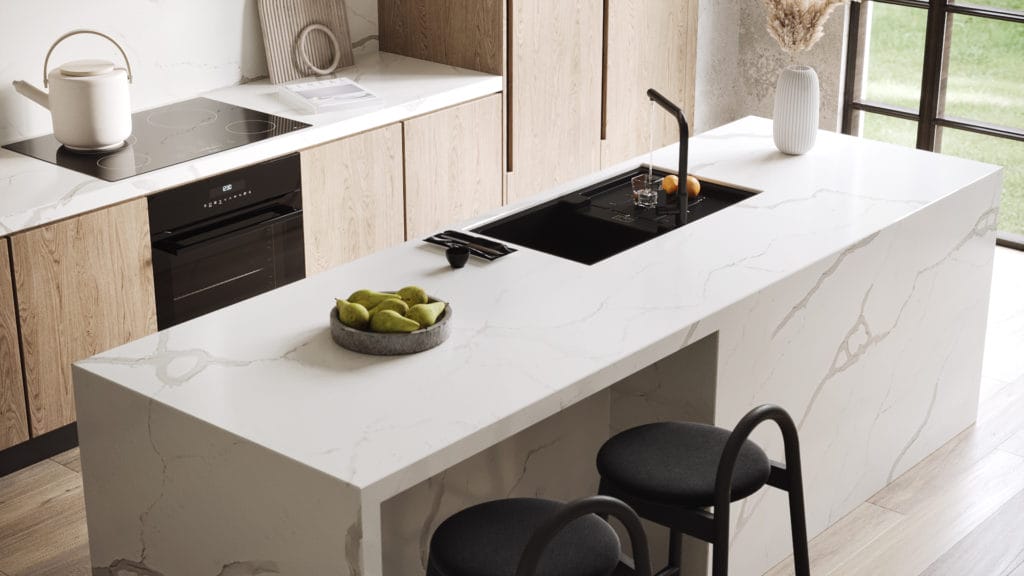When looking for the perfect kitchen and bathroom surfaces, one should prioritize not only beauty and durability but also hygiene. Amidst various material options, Mars Quartz emerges as a popular choice, celebrated not only for its aesthetic appeal but also for its reputed resistance to bacterial growth. This blog post examines the benefits of hygienic quartz countertops, shedding light on whether bacteria can find a foothold on this favoured surface.
Can bacteria grow on quartz countertops?
Quartz Countertops boast a nonporous surface, engineered from a blend of natural quartz crystals, polymer resins, and pigments. This critical feature forms the cornerstone of quartz’s hygienic reputation. Unlike porous materials that offer crevices for bacteria and viruses to thrive, quartz’s seamless surface provides no such refuge. The absence of pores means spills, and moisture cannot penetrate the surface, effectively reducing the risk of bacterial growth and making quartz an ally in maintaining a clean and safe kitchen or bathroom environment.
Can Mold Grow on Quartz Countertops?
The short answer is: no. Quartz Countertops, renowned for their sleek appearance and enduring nature, also boast a significant hygienic advantage. The question of whether mould can grow on quartz surfaces is met with a reassuring response due to the material’s nonporous quality. This engineered stone is crafted from quartz crystals bound with polymer resins, creating a surface that denies moisture—the lifeblood of mould—the opportunity to penetrate and increase. While mould spores can land and exist temporarily on any surface, quartz’s nonporous attribute ensures that these spores cannot find the moist crevices necessary for growth. Regular cleaning practices, involving mild soap and water, are sufficient to keep quartz countertops free from mould and other microbial life forms. This makes quartz an exemplary choice for maintaining a clean, mould-free environment in kitchens and bathrooms, spaces particularly prone to moisture.
Is Quartz Antimicrobial?
Mars Quartz, with its elegance and resilience, also draws attention to its hygienic properties, prompting inquiries into its antimicrobial capabilities. A quartz countertop nonporous surface prevents microbial growth. The dense, seamless nature of engineered quartz countertops leaves no room for bacteria, viruses, or fungi to penetrate and establish colonies. This characteristic significantly reduces the potential for microbial proliferation, contributing to a cleaner and safer surface. However, it’s essential to note that the antimicrobial efficacy of mars quartz can be further enhanced through regular Quartz Care and Maintenance. By swiftly addressing spills and avoiding abrasive cleaning agents, you can preserve the hygienic integrity of their quartz surfaces. Quartz’s design and maintenance ease contribute to a significantly lower risk of microbial contamination, aligning with the needs of health-conscious individuals seeking both beauty and functionality in their living spaces.
Cleaning and Maintenance
The ease of cleaning quartz further bolsters its hygienic credentials. Simple daily cleaning routines, involving gentle soap and water, are typically sufficient to keep the surface clean and reduce the potential for bacterial proliferation. For homeowners, this means a hassle-free maintenance regime that supports a hygienic living space without the need for harsh chemicals or rigorous scrubbing.
Certifications and Standards
Various certifications and standards assess the hygienic properties of surface materials. Quartz Countertops often meet these rigorous criteria, reinforcing their status as a sanitary choice. Manufacturers may subject their Mars Quartz products to tests that evaluate their resistance to bacteria and other microorganisms, providing an additional layer of assurance to consumers concerned with cleanliness and health.
Considerations for Maximum Hygiene
While quartz inherently resists bacterial growth, homeowners can take further steps to ensure their Countertops remain as sanitary as possible. Regular cleaning, especially after preparing raw meats or handling potent staining substances, remains crucial. Additionally, promptly addressing spills and avoiding the use of abrasive cleaners preserve the integrity of the quartz surface, supporting its hygienic benefits.

Hygienic Quartz Countertops: Care and Maintenance Guide
Conclusion: Quartz as a Beacon of Hygiene
Quartz Countertops stand out as a preferred option for homeowners seeking a harmonious blend of style, durability, and hygiene. With its nonporous surface acting as a natural deterrent to bacteria and easy maintenance routine, quartz offers peace of mind for those aiming to create a clean and healthy environment in their kitchens and bathrooms. As we continue to prioritize cleanliness in our living spaces, quartz surfaces provide a reliable and attractive solution that meets the demands of modern home design while upholding the highest standards of hygiene.













